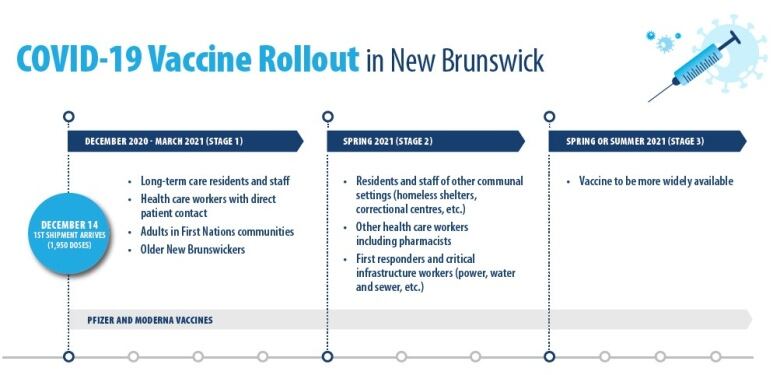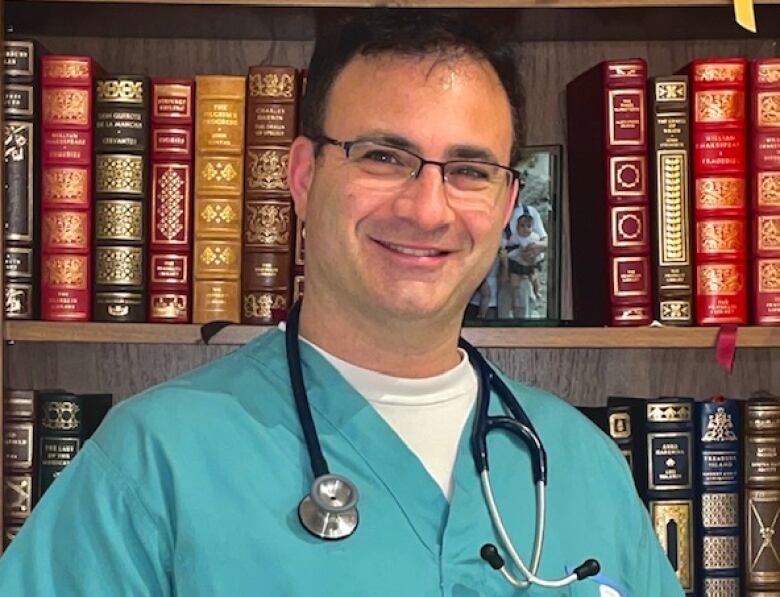Health minister says vaccine rollout details will be revealed next week
Fully vaccinated people should still follow all public health protocols

New Brunswickers still waiting for a COVID-19 vaccine will get a better idea soon where they stand in the queue, said Health Minister Dorothy Shephard on Thursday.
"We're going to have a whole lot more to say about the rollout of those vaccines coming out in the next couple of weeks," she said during the province's live-streamed briefing.
"We're actually working on a plan for next week to inform the public as to why the variant is a big concern as it is, and then vaccine rollout pending that."
Shephard said it's difficult to answer questions about vaccine rollout "when the supply is so much in question. And so we're being guarded about how we unroll this information."
She said the province is also still working on the order and criteria of the priority groups.

Nova Scotia
But with similar delays and uncertainty about vaccine supplies, Nova Scotia announcedWednesday it will begin vaccinating all residents over 80 beginning on Feb. 22.
A number of clinics will be held around the province. Eligible Nova Scotians will be identified through the province's Medical Services Insurance program and contacted by mail to schedule an appointment.
Once that group is vaccinated, those between 75 and 79 will be next. Vaccinations will continue in declining five-year age blocks until all Nova Scotians are immunized.
That approach follows the advice from the federal government's National Advisory Committee on Immunization, which has told provinces to start with those who are over 80 and then decrease by five-year increments as supply becomes available until everyone over 70 has been inoculated.
Fully vaccinated still have to comply
As of Monday, 4,460 New Brunswickers have been fully vaccinated.But that doesn't mean they get to ignore all of the public health protocols.
Scientists still don't know if fully vaccinated people can still transmit the virus.
"The quick answer is that we still have no idea if the vaccine stops the virus spreading," said Brian Dixon, a professor in the biology department at the University of Waterloo.
Until that's clear and it could be a while until it is "vaccinated individuals should continue to mask up, wash hands, distance and isolate like everyone else. If they don't, they could be a risk," he said.
A question sent to the Public Health Agency of Canada last week got this response: "There is limited evidence on whether someone who received the vaccine is still able to spread the virus."

The message goes on to say that even someone who has been fully vaccinated should continue to wear masks, social distance, wash hands, stay home if you have symptoms, and all the other things that local public health officials advise.
The message also said to avoid the 3 Cs as much as possible closed spaces, crowded places, and close interactions.
"Risk is higher in settings where these factors overlap or involve activities such as singing, shouting or heavy breathing (e.g., during exercise)."
New variants of COVID-19
Experts also aren't sure how effective current vaccines developed before the emergence of mutations are against new variations.
"The vaccine seems to be protective, but it's not 100 per cent clear on that yet," said Dr. Barry Pakes, a physician and assistant professor at the University of Toronto's Dalla Lana School of Public Health.
Easing restrictions for the immunized?
For now, national and provincial officials aren't prepared to ease restrictions for those who have been inoculated against COVID-19.
Once enough people are vaccinated, Pakes said restrictions can be lessened but we're not there yet.
"Across Canada now, there are no significant populations that are actually covered in a way that would mean that we should be changing anything right now," said Pakes.
"Once the people who are most at risk are totally vaccinated, and long-term care facilities and the elderly, then I think we'll be able to tolerate higher caseloads without that higher mortality, and the impact on the health-care system."

But Pakes thinks that's still a long way off. Given the situation in Ontario, he said it could be June before public health restrictions can be lifted.
"So for now, everybody, even if you are vaccinated, even if you had COVID already those people still need to keep doing the same things because this is far from over.
"And we really don't quite understand what the new variant is going to be doing. There is increased rates of reinfection. The infection can happen a little bit faster and increase transmissibility. So, you know, we're watching that very carefully."
On Thursday, Dr. Jennifer Russell, the province's chief medical officer of health, said the new variants are between 30 and 70 per cent more contagious.
How long do vaccines last?
Pakes said it's not clear how long vaccines will work against COVID-19. It's just too early in the process.
"It only has been a couple of months since the vaccination campaign started globally. So we really don't know how long it's going to last."
He said there's no reason to think that the vaccine is more short-lived than other vaccines, but it's possible that a yearly booster may be necessary.
"There's no reason to speculate about that now because we're a long way from making some policy decisions around that."
Vaccine rollout in New Brunswick
In recent weeks, provincial health officials have referred to targets for vaccination, including having all residents and staff of long-term care homes vaccinated by the end of March, with the priority given to those over 85.
The province has said the first phase of vaccinations will target four groups long-term care residents and staff; health-care workers with direct patient contact, all adults in First Nations communities, and older New Brunswickers.
But repeated requests to the province to define what "older" means have gone unanswered.
On Thursday, department spokesperson Shawn Berry said "due to the small number of doses of vaccine currently available, we expect it to take until early spring to offer vaccinations to everyone in the first group."
Berry said, "Any reduction in shipments or shipment sizes impacts our ability to deliver vaccine to New Brunswickers. We expect that following the current reduction, we will have access to more vaccine moving forward."
The second stage will target priority groups like residents and staff of "communal settings," and health-care workers, first responders and critical infrastructure workers.
The province has been the most vague about the "subsequent" stages. On its website under "vaccine rollout," the province says it's basing its approach on the advice of the National Advisory Committee on Immunization.
It lists these key populations to be immunized first: nursing home residents and staff, healthcare workers, older seniors, and adults in Indigenous communities. But all of those groups are already listed in previous phases.
Underlying health conditions
It's also not clear when people with underlying health conditions will be vaccinated. From the beginning, health experts warned that people with certain health problems were more at risk of developing dangerous symptoms of COVID-19.
British Columbia, for example, has put this group into the first phase of vaccinations. While priority will be given to residents and staff of long-term care homes and health-care workers, as more doses become available, the priority list will expand to those with underlying health conditions.












_(720p).jpg)


 OFFICIAL HD MUSIC VIDEO.jpg)
.jpg)



























































































